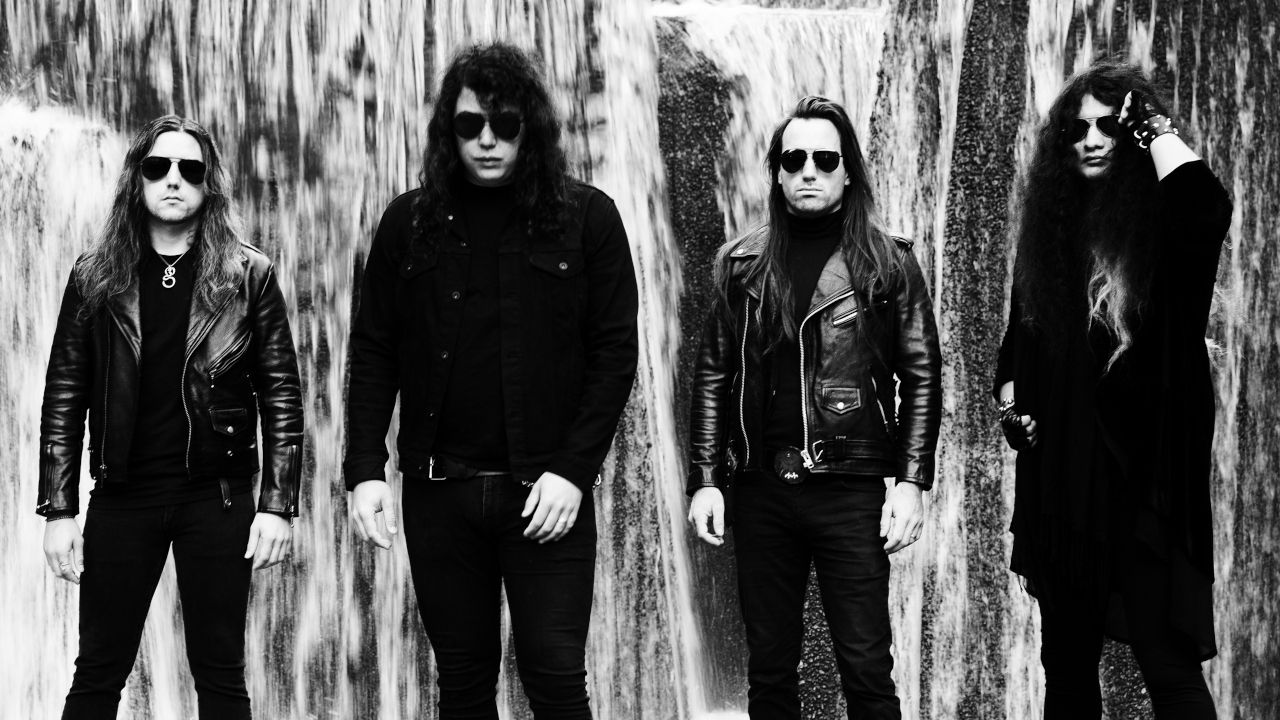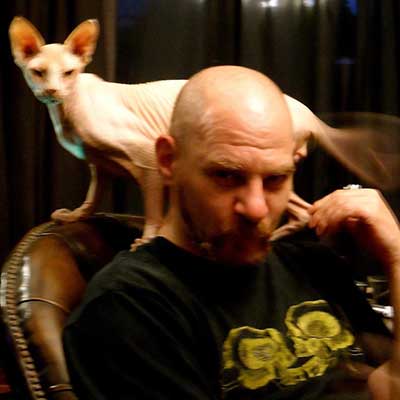For a man who’s rapidly become the figurehead for the goth and post-punk revival that’s been creeping ever deeper into the metal underground, Unto Others frontman Gabriel Franco is far from the arch, cryptic creature of the night you might expect. Sitting in his Portland study and talking to Hammer over Zoom, he’s good-natured and utterly unpretentious, but you can sense a restlessness, too. After all the uncontainable, grassroots buzz and critical acclaim that greeted their 2019 debut album, Mana – released under their former name, Idle Hands – leading to a tour supporting King Diamond and becoming Roadrunner labelmates with Slipknot, Trivium and Gojira, he’s clearly still trying to figure out the round hole he’s found himself fitting into.
“I’m extremely cynical,” he says, “so my first thought when we were getting all this attention was, ‘Oh god, are we the new hype band? Because if we are, how long will this last?’ So the more popular we’ve gotten, the more pressure there is for me to not fuck it up.”
Gabriel needn’t worry. For a start, the extreme and retro metal scenes he came out of don’t give out their laurels lightly, their few breakout bands charged with carrying committed, anti-opportunistic ideals to the wider world. Plus, the post-punk and goth DNA injected into the underground stems from two fiercely independent bands, Sweden’s In Solitude and Finland’s Beastmilk (now Grave Pleasures), whose respective late-2013 albums, Sister and Climax, laid the ground for a host of bands to follow in their wake. German black metallers Secrets Of The Moon, hardcore punks Okkultokrati and atmospheric Icelanders Kontinuum were just some of the artists paying attention.
But if the aftermath of In Solitude and Beastmilk’s rekindling of the early 80s has hovered just under the radar of the wider metal scene, it’s Unto Others who are turning that skeletal drumbeat into a rallying cry. Their seamless fusion of haunted yet driving gothic grooves and barnstorming, classic metal anthems hasn’t just hit a contemporary nerve, but all manner of pleasure centres around it, turning familiar sources into something revelatory and instantly galvanising.
“In Portland, the response was extremely positive from the start,” says Gabriel. “I’m sure some people talked shit about us, but it wasn’t cool to talk shit about us. It was also regular metal dudes coming up to us at gigs, like Lamb Of God fans. At the same time, I don’t trust a lot of people right off the bat. I’m always cordial, but a lot of the time I’m like, ‘OK, what’s your fucking angle, man?’ That was a joke in the old bands I used to play in. Someone would come up and say, ‘Hey great set, man’, and to each other we’d be like, ‘What’s their fucking angle?’ Ha ha ha!”

Bands as instantly celebrated as Unto Others don’t tend to arrive out of nowhere. Gabriel had cut his teeth in a black metal band in his teens and then more traditional speed/power metal bands, Spellcaster and Silver Talon, before frustration forced his hand to break out and start something different
“The local scene at the time was definitely something I was reacting against, especially as I got into my mid-to-late 20s,” says Gabriel. “The traditional and black metal fanbase here is really cool, but it seemed like a lot of people wanted to start throwback bands and pigeonhole themselves. With Silver Talon, I thought, ‘I’m still not doing this the way I want to, so I’ve got to leave this and start my own thing.’ So I definitely had a chip on my shoulder for 10 years in defiance of everything around me.”
The then-Idle Hands, formed in 2017, didn’t start off with a specific mission statement. As Gabriel puts it, “I did notice the shift to gothiness in the scene after the Beastmilk album. I tried to keep our music grounded in heavy metal, because that’s eternal, but then goth has been around for a long fucking time. I was never dead set on any specific sound, I was just willing to work with people as long as they were willing to work with me. The only really goth band I really liked at the time was The Sisters Of Mercy, but I fucking loved them. In Portland there used to be a place called Lovecraft Bar; it was a goth, metal place – but more goth than metal – and it was always packed. I think it had an effect on the scene. The punks and the metal dudes would fall back into that place, because, hey, you can dance to that shit!”
If the Lovecraft Bar had some bearing on the band’s sound, the idea of mixing cultures was nothing new to Gabriel. Born to an American mother and Mexican father, who divorced when Gabriel was young, he grew up with a Vietnamese stepdad, all the different influences forming part of his upbringing.
“It was very colourful, very cool and vibrant,” says Gabriel. “I’m also one of six brothers, so I was always fighting for attention. You could probably dive into my childhood past and figure out why I do what I do.”
As fast as Unto Others have risen, the path hasn’t been without obstacles. After signing with Roadrunner as Idle Hands, they discovered another band with the same name: a “blues band, they play farmers’ markets”, but who were also determinedly litigious. Coming to terms with the resultant name change wasn’t easy.
“It was devastating,” Gabriel admits. “It was precisely the stages of grief starting with denial. I just ignored it for months. We had to come to terms with the fact that we couldn’t keep the name, and I have a list of all the stupid-ass ideas that I tossed in the trash can, but ‘Unto Others’ was the most in keeping with what we were doing. I felt like it had the same biblical impact, the same metal and goth undertones to it. I’ve always thought about what I’m doing and what I’m writing in the context of the name of our band, and I did have to slightly shift that. Whereas Idle Hands was more of a gothy, almost Halloween-y cemetery feel, this one is a bit more blunt. I feel this one is more metal than goth, if that makes sense. And I think it does affect the music.”
As much as the band’s recently released second album, Strength, is awash with breathless, towering bangers such as opener Heroin, it resonates far beyond being just a meticulously measured genre mash-up. For all the added references to the Misfits and even The Smiths, Strength is a deeply personal album. It tunes into the exhaustion, the feelings of being left behind, the stubborn holding on to the residue of dreams that’s defined our Covid age and gives them a dramatic weight, making an epic, forlornly noble stand.
“I do think there’s a definite shift from the first to the second record,” admits Gabriel. “Whereas Mana was fun and dark, this one is more bleak. While we were recording Strength there was a sense of being lost in a tunnel of darkness, and having no clue when you are going to get out. You still have the hooks, you still have the melodies, but especially lyrically, the album just feels a bit more depressive and hopeless.”
What was that reflecting?
“Just specifically the times we were in. There was so much stress going on in 2020, not just for the obvious reason of Covid, but also not just having any clue of when live music was coming back. I knew Strength was coming out on a larger label. I feel with Mana we were on the rise, there was a positive atmosphere, and now you’re being dragged down into the real world. I feel responsible for my bandmates, like I don’t want to fail them and they all have to go back to their day jobs. So it was written under a lot of pressure. It’s why the title works so well for the album; it’s what I was searching for to get to the other side.”
Gabriel may be unguardedly candid about the making of the album, but it’s his capacity for self-reflection that gives Strength such depth. As with Climax, it’s an album you can party to, but one that takes on added adrenaline from its keenly anxious edge.
“We need to maintain our own identity, and the way that I do that is by being honest,” Gabriel says. “I have these influences and I have these bands I love, but I run them through my own emotions and then I put it on the record. People want something authentic in music, something that they can connect with. I figured as long as I can stay honest with myself and the music, the end product will do that.”
Strength is out now via Roadrunner. Unto Others tour the UK in March/April 2022.


